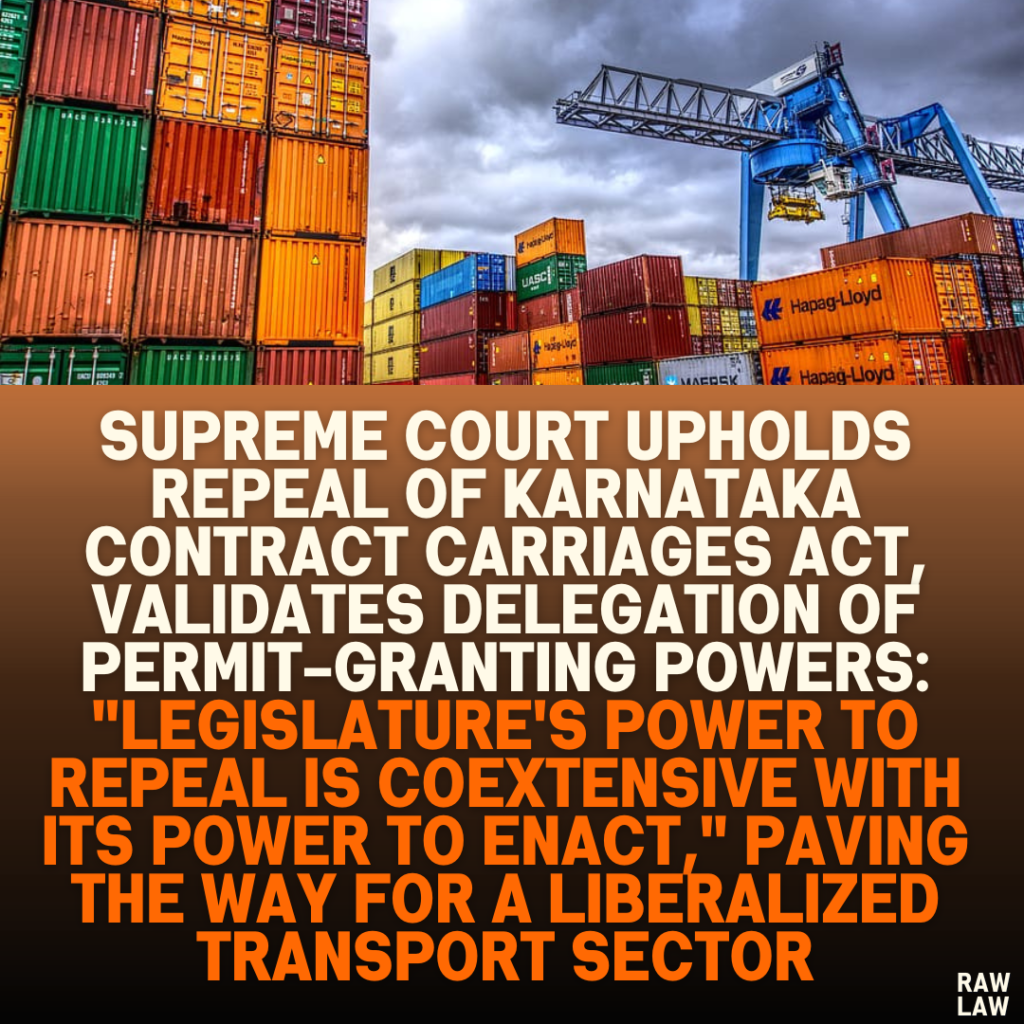Court’s Decision
The Supreme Court upheld the Karnataka Motor Vehicles Taxation and Certain Other Law (Amendment) Act, 2003 (2003 Repeal Act), repealing the Karnataka Contract Carriages (Acquisition) Act, 1976 (1976 Act). It also ruled that the delegation of permit-granting powers by the State Transport Authority (STA) to the Secretary for issuing non-stage carriage permits (including contract carriage, special, tourist, and temporary permits) is valid. The Court dismissed the Karnataka State Road Transport Corporation’s (KSRTC) challenge, validating the appeals of private bus operators and the Karnataka STA.
Facts
- The 1976 Act: Enacted to acquire privately operated contract carriages and vest them in state-owned corporations like the KSRTC to ensure public control and better transport services. The Supreme Court upheld this Act’s constitutionality in earlier cases under Articles 39(b) and (c) of the Constitution.
- The 2003 Repeal Act: Repealed the 1976 Act with the objective of liberalizing the transport sector, allowing private operators to address shortages, particularly in rural and semi-urban areas. The intent was to provide competition, improve passenger comfort, and enhance public transport.
- Disputes Post-Repeal: Private operators started applying for permits under the liberalized framework. KSRTC and its employees challenged this liberalization, arguing that the repeal was unconstitutional and delegation of permit-granting powers to a Secretary was impermissible.
Issues
- Whether the 2003 Repeal Act repealing the 1976 Act is constitutionally valid.
- Whether delegation of quasi-judicial permit-granting functions by the STA to the Secretary is permissible under the Motor Vehicles Act, 1988.
Petitioner’s Arguments (KSRTC)
- Unconstitutional Repeal: KSRTC argued that the 2003 Repeal Act was unconstitutional because:
- The 1976 Act was enacted under Entry 42 of the Concurrent List and had received Presidential assent. Repealing it required fresh assent.
- The repeal undermined Supreme Court precedents that upheld the 1976 Act.
- Misuse of Permits: Repealing the 1976 Act removed safeguards against private operators misusing permits, thereby eroding KSRTC’s statutory monopoly and harming public transport services.
- Non-Delegability of Functions: Argued that issuing permits is a quasi-judicial function requiring collective decision-making by the STA or RTA, and delegating such powers to the Secretary violates the statutory framework.
Respondent’s Arguments (Private Bus Operators and STA)
- Legislative Power to Repeal: The respondents argued that the legislature has the inherent power to repeal a statute it enacted if the repeal aligns with changing socio-economic needs.
- Delegation is Statutorily Allowed: Section 68(5) of the Motor Vehicles Act and Rule 56(1)(d) of the Karnataka Motor Vehicles Rules explicitly allowed STA to delegate certain powers to its Secretary.
- Administrative Efficiency: Delegation to the Secretary ensured faster processing of routine applications and avoided unnecessary delays that would occur if multi-member bodies handled every permit application.
Analysis of the Law
1. Constitutionality of the Repeal Act
- The Court held that the power to repeal a law is coextensive with the power to enact it. The 2003 Act, enacted under Entry 42 of the Concurrent List, was validly within the legislative competence of the State Legislature.
- Presidential assent was not required for the repeal, as it merely extinguished the 1976 Act’s provisions and did not re-enact a fresh legal framework.
- The Court emphasized that legislative policy is dynamic and can change in response to evolving public needs. The repeal was backed by a clear legislative intent to liberalize transport and address the growing demand for public transport services.
2. Delegation of Permit-Granting Powers
- Section 68(5) of the Motor Vehicles Act allows the STA to delegate its functions to any authority or person, provided rules are framed under Section 96. Rule 56(1)(d) of the Karnataka Motor Vehicles Rules permits such delegation for non-stage carriage permits.
- The Court differentiated between stage carriage permits (non-delegable due to their complexity) and routine permits like contract carriage, special, tourist, and temporary permits. Delegation for the latter was deemed efficient and necessary.
- The Court relied on Newtech Promoters & Developers Pvt. Ltd. v. State of Uttar Pradesh, where it was held that quasi-judicial functions can be delegated if explicitly provided by statute.
Precedent Analysis
- State of Karnataka v. Ranganatha Reddy: Upheld the 1976 Act’s constitutionality but did not restrict legislative power to repeal it.
- Newtech Promoters & Developers Pvt. Ltd. v. State of Uttar Pradesh: Confirmed that delegation of quasi-judicial functions is valid if provided for by statute.
Court’s Reasoning
- Legislative Competence: The Court affirmed the State Legislature’s authority to repeal the 1976 Act to adapt to current socio-economic realities.
- Delegation Validity: Delegating routine permit functions to the Secretary under Rule 56(1)(d) was consistent with the statutory framework and ensured administrative efficiency.
- Practical Necessity: Without delegation, the STA would be overwhelmed, causing delays and inefficiencies in public transport service delivery.
Conclusion
- Validity of the Repeal Act: The repeal of the 1976 Act is constitutional.
- Delegation of Powers: Delegating permit-granting functions to the Secretary is legally valid and administratively necessary.
- Disposition: The appeals of KSRTC were dismissed, while the appeals of private operators and the STA were allowed. The High Court’s orders against delegation were set aside.
Implications
- Liberalized Transport Sector: Encourages private operators to contribute to public transport, potentially increasing competition and improving service quality.
- Efficient Administration: Validates delegation mechanisms, ensuring faster and smoother processing of routine transport permits.
- Policy Shift: Reflects a legislative move away from monopolistic control towards a competitive, demand-driven public transport framework.




Pingback: Bombay High Court: Writ Petition Against IGST Demand and Limitation Extension Dismissed— "Statutory Remedies Must Be Exhausted First, Notification Can Be Challenged Separately" - Raw Law